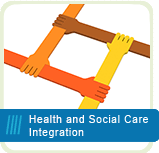Health and Social Care Integration
Key Message


Health and Care Integration in Scotland is the most substantial
reform of our health and social care services in a
generation.
At its heart, health and social care integration will enable
services to work together effectively to support people to achieve
the outcomes that matter to them. It will ensure that health and
social care provision across Scotland is joined-up and seamless,
especially for people with long term conditions and disabilities,
many of whom are older people. This change in health and
social care services is enshrined in law in The
Public Bodies (Joint Working) (Scotland) Act 2014.
Up until now health boards have delivered health care and local
authorities provided social care. Now, within each geographical
area, health boards and local authorities are required to establish
integrated partnership arrangements. These new Integrated Health
and Social Care Partnerships mean that Community Health
Partnerships will cease to exist.
You may want to explore some of the work to tranform role here
What does this mean for the Effective Practitioner?
The effective practitioner must consider more than the changing structures of health and care organistions. New ways of working that build on current practice may transform many roles across health and care. Practitioners will work in more intergated ways and develop insight into the various roles in wider multi-disciplinary teams.
You should consider exploring the pages in the signpost sections that link to care providers that you are less familiar with. You may also want to explore the national and governmental resources to keep abreast of these signifianct reforms.
![]() You can download a copy of
the Health
and Social Care Integration learning activities.
You can download a copy of
the Health
and Social Care Integration learning activities.
Reflection
Remember, recording your reflections is an important part of the learning process. Take time to structure your thoughts, feelings and any future actions on one the forms available in the Reflective Practice section. Click here to visit the page.
In your reflections you could also consider how your learning relates to the Facilitation of Learning, Leadership and Evidence, Research and Development pillars of practice.
Return to top
